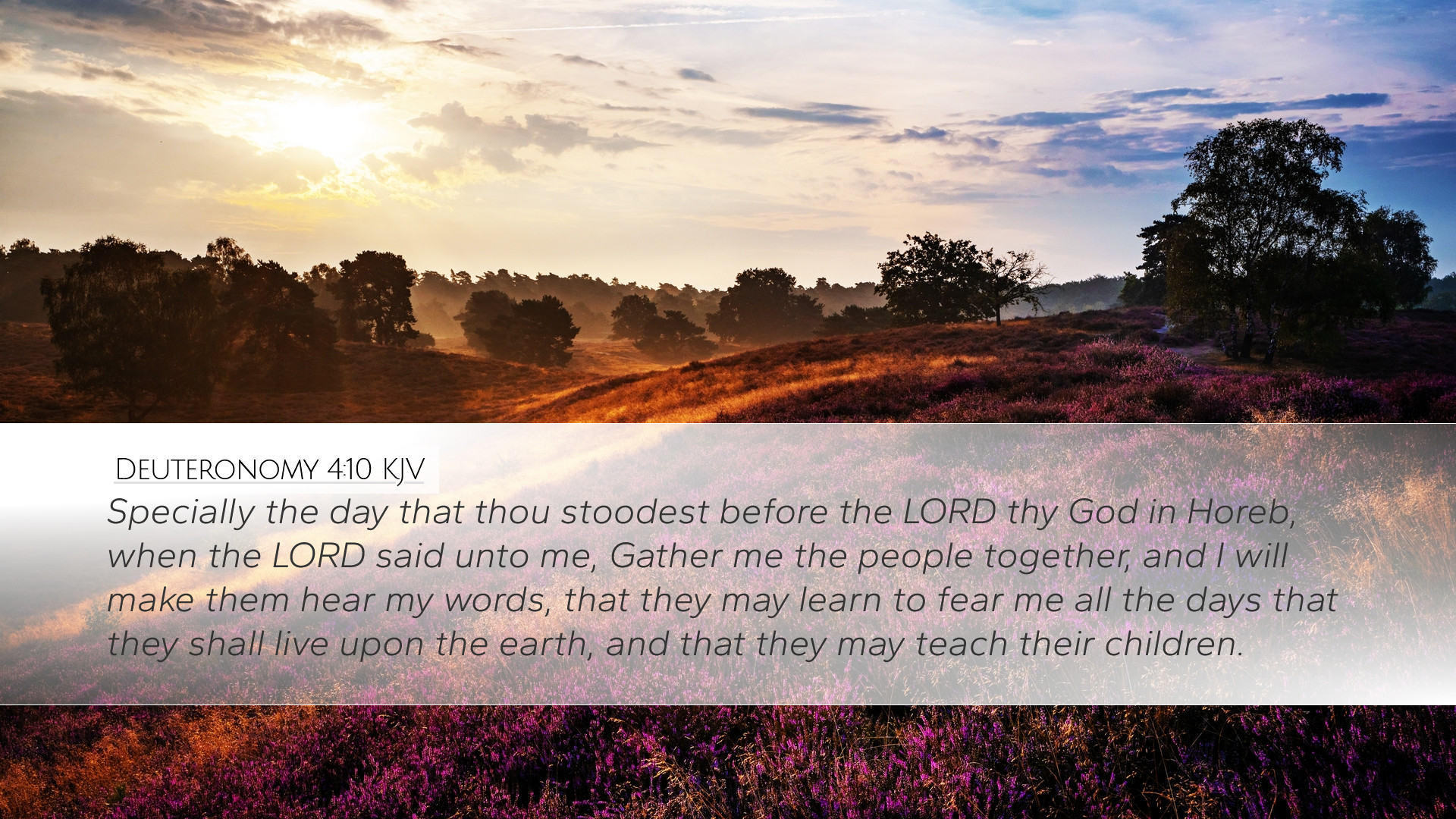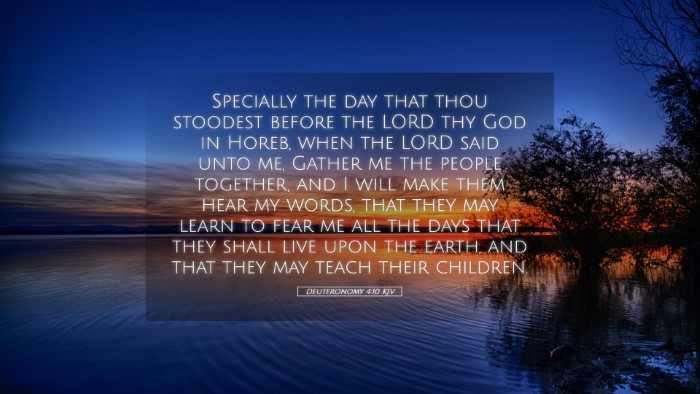Commentary on Deuteronomy 4:10
Bible Verse: "Especially the day that thou stoodest before the LORD thy God in Horeb, when the LORD said unto me, Gather me the people together, and I will make them hear my words, that they may learn to fear me all the days that they shall live upon the earth, and that they may teach their children." (Deuteronomy 4:10)
Introduction
Deuteronomy 4:10 stands as a pivotal verse within the Pentateuch, calling attention to God’s communing with His people and the foundational significance of His Law. The exhortation from Moses reflects crucial theological concepts: the importance of memory, reverence for God, and the transference of faith to future generations. This commentary will delve into the insights of respected theologians and biblical scholars to elaborate on the implications of this verse for individuals seeking to understand their faith more deeply.
The Context of Deuteronomy
Deuteronomy serves as Moses' farewell address to the Israelites before they enter the Promised Land. He recounts their history, emphasizes the necessity of obedience, and calls them to remember their covenant with God. The context in which the verse appears is vital, emphasizing a collective remembrance of God's commands and the critical moment at Mount Horeb.
Moses' Plea for Remembrance
In this verse, Moses instructs the Israelites to remember the event at Horeb where God formally established His covenant with them. According to Matthew Henry, this remembrance is not merely historical but functional, as it serves to instill a deep and enduring fear of God within their hearts.
Albert Barnes adds that the act of gathering the people to hear God's words reflects a divine method of communication that is communal and instructive. God desires not just individual piety but a collective understanding and reverence for His statutes, which must be nurtured within the community.
The Fear of the Lord
The phrase "that they may learn to fear me" captures the essence of wisdom literature throughout the Scriptures (Proverbs 1:7). Adam Clarke emphasizes that this fear is not a paralyzing dread but a profound respect and reverence for God’s holiness and authority, which is foundational for spiritual maturity.
This healthy fear impels believers to act righteously and seek divine guidance in their lives. It drives home the necessity of reverence as the starting point for understanding God's nature and character.
Learning and Teaching
God's directive to gather the people and for them to hear His words revolves around the themes of learning and teaching. This dual purpose is vital for sustaining their identity as God’s chosen people. Matthew Henry notes that God intends for the knowledge of His words to be preserved, perpetuated, and passed down through generations.
- Learning: The congregation is commanded to hear and internalize God's words, emphasizing the importance of understanding divine truth.
- Teaching: The responsibility extends to ensuring that these truths are transmitted to future generations, particularly children. Clarke points out the vital role of the family and community in spiritual education.
The Generational Impact
The latter part of the verse underscores the importance of teaching the coming generations. Albert Barnes reflects that this teaching is not merely passive, but requires active engagement of the parents and leaders within the community. The fear of the Lord instills a framework for living that is essential for the survival of their identity as a holy nation.
The transmission of faith practices—prayer, worship, moral conduct, and understanding God’s laws—becomes a vital act of communal responsibility. As Henry observes, neglecting this duty could lead to spiritual decay and loss of identity among the newer generations.
Theological Implications
The theological implications of Deuteronomy 4:10 reach far beyond its immediate context. It emphasizes a God who is not only transcendent but also immanent, desiring a relationship with His people through communication and covenant. Clarke’s assessment of this revelation highlights God's initiative in the relationship, as He brings His people together to hear His words directly.
This interaction reflects a key aspect of Christian theology: God’s desire for personal and communal relationships is foundational to faith. The call to remember and fear the Lord remains an ever-relevant exhortation for believers today. Shepherding and nurturing faith within the community reflects the character of God as relational and involved in the lives of His followers.
Conclusion
Deuteronomy 4:10 encapsulates a profound call to remembrance, reverence, learning, and teaching. As followers strive to obey God’s commandments, they must engage in the active remembrance of His words, champion the importance of fearing the Lord, and commit to passing down their faith to the next generation. The insights from renowned theologians and biblical scholars bring to light the enduring significance of this passage. As communities of faith continue to grow and evolve, the timeless truth found in this verse serves as both a reminder and a guide to the path of righteousness and spiritual fulfillment.


